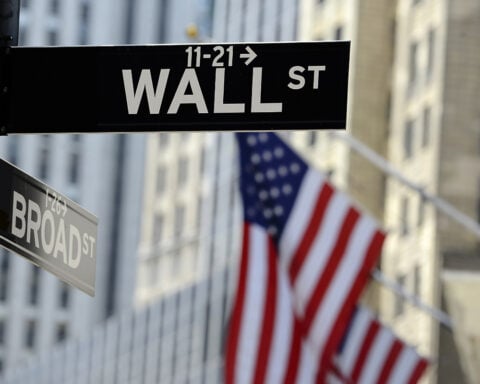Disney shares and ongoing concerns about regional banks contributed to a decline in the Dow Jones Industrial Average and S&P 500.
The S&P 500 saw a 0.2% decline, while the Nasdaq managed to gain 0.2%. This followed lower-than-expected wholesale inflation data and Disney’s earnings report. The Dow experienced a loss of 243 points, equivalent to a 0.7% decrease.
Disney shares plummeted more than 8% after the company released its fiscal second-quarter results. Despite narrowing losses in its streaming division due to increased prices, the company suffered a significant blow to subscriber growth. As Disney removes more content from its streaming platforms, it will incur impairment charges of $1.5 billion to $1.8 billion.
Investor concerns regarding regional banks resurfaced, particularly with PacWest Bancorp. In a 10Q filing, PacWest reported a 9.5% decline in deposits during the previous week. As a result, PacWest shares dropped by 22%. However, the bank stated it had immediate access to $15 billion in liquidity if necessary.
Dylan Kremer, co-chief Investment Officer of Certuity, commented on the situation, stating that investor focuses now on the economic backdrop, liquidity, interest rates, and inflation. The news about PacWest Bank adds to the fragile sentiment surrounding regional banks and the overhang of the debt ceiling issue.
The producer price index (PPI), a preferred measure of inflation by the Federal Reserve, showed a modest increase of 0.2% in April. Economists surveyed by Dow Jones had expected a 0.3% advance. This data follows the consumer price index report from the previous day, which indicated a year-over-year inflation rise of 4.9%, falling below expectations.
The Department of Labor reported that initial jobless claims rose by 22,000 to 264,000. This marks the highest reading since October 30, 2021.
Ed Moya, senior market analyst at Oanda, commented on the PPI and jobless claims data, stating that Wall Street didn’t receive any surprises. Moya explained that producer prices are expected to decline as supply chains normalize while rising jobless claims provide further evidence of an easing labour market.
S&P 500 Ends Year-Over-Year Losing Streak, Indicating Potential Future Gains
The S&P 500 had experienced a year-over-year losing streak for 12 consecutive months, which ended in April. Historically, this turnaround has indicated strong returns in the future.
The S&P 500 posted higher returns after breaking a year-over-year loss streak of at least 12 months every time, according to Todd Sohn, a technical strategist at Strategas. On average, the S&P 500 saw a 12.6% increase when comparing the month the streak ended with the same month one year later. After 32 months of losses, the S&P 500 ended its longest year-over-year streak in July 2003.
Beyond Meat Shares Plummet Following Stock Offering Announcement
After Beyond Meat announced that it plans to sell up to $200 million of its common stock to the Securities and Exchange Commission, its shares fell by 12.6%.
The company intends to utilize the proceeds for general corporate and working capital purposes.
As a result of the decline in share price, Beyond Meat reported a loss of 92 cents per share, compared to analysts’ expectations of $1.01 per share. Revenue for the quarter came in at $92.2 million, surpassing the expected $90.8 million.
Google’s AI Announcements Boost Wall Street Confidence
Analysts are increasingly confident in Google’s AI capabilities following the artificial intelligence announcements made at the company’s I/O event. Morgan Stanley analyst Brian Nowak stated that AI is reshaping all of Google’s products faster than anticipated. He believes this will enhance investor confidence in the company’s business durability and future AI potential.
Alcoa Expected to Benefit from Rising Aluminum Prices
Credit Suisse has upgraded Alcoa, a leading aluminum production company, from neutral to outperform. The analyst, Curt Woodworth, named it a top pick and set a price target of $50, suggesting a potential upside of 38.4% from the previous day’s closing price. The optimism is driven by expectations of a rebound in aluminum prices, which would be favourable for Alcoa.
First Citizens BancShares Could Continue to Rally, Says KBW
KBW, a financial services firm, believes that First Citizens BancShares, a regional bank known for acquiring Silicon Valley Bank’s assets, has the potential for further gains. As a result of Brady Gailey’s outperform rating, his price target has been raised from $950 to $1,500.
Gailey highlighted that the bank’s valuation would likely improve as more investors become familiar with the new FCNCA, which could drive the stock higher.
Western Alliance Reports Deposit Growth
In contrast to PacWest Bancorp’s decline in deposits, Western Alliance, another regional bank, announced that its deposits have been growing. Since May 2, the bank reported a $600 million increase in deposits. Moreover, as of May 9, 79% of its deposits were insured. After initially falling in early trading, shares of Western Alliance rebounded and were up 1.3%.
Peloton Shares Slide on Bike Recall
Peloton faced a nearly 6% drop in shares after announcing the recall of approximately 2.2 million exercise bikes due to safety concerns. The Consumer Product Safety Commission received reports of the bike’s seat post breaking and detaching during use, leading to injuries such as fractured wrists. Peloton provides a free seat post that users can install to address the issue.
Positive Economic Data May Lead to Fed Pause
The Federal Reserve should pause rate hikes after recent releases of consumer price index and producer price index data, according to Chris Zaccarelli, chief investment officer at Independent Advisor Alliance. According to Zaccarelli, the market’s positive performance is supported by the strong economy, corporate profits, and excellent inflation data. He cautions, however, that investors should not overlook the potential recession risk on the horizon.
Dow Starts with Decline, Alphabet Shares Rise
The Dow Jones Industrial Average opened the session with a drop of over 200 points, primarily driven by the disappointing results from Disney. The S&P 500 also experienced a 0.4% slide, while the Nasdaq Composite had a marginal decrease. Conversely, shares of Alphabet, the parent company of Google, climbed over 4% following the unveiling of new AI tools at its developer conference.
Google announced that it incorporates AI into its poster search feature and will introduce new capabilities to its online office suite. Awaiting its chatbot Bard will be removed from the waitlist, and PaLM 2 is the company’s latest large language model.
Following the conglomerate’s quarterly report, Hindenburg Research intensifies its short-selling campaign against Carl Icahn’s Icahn Enterprises. The short seller, led by Nathan Anderson, claims that Icahn Enterprises’ financial report failed to address the red flags previously raised by Hindenburg. Last week, Hindenburg initiated a short position against Icahn’s company, citing “inflated” asset valuations and a higher net asset value premium in the publicly traded holding company’s shares.
As a result of a 4.1% decline in the hedge fund, Icahn Enterprises reported a $270 million net loss in the first quarter. The company declared a quarterly dividend of $2 per share. As a result of Hindenburg’s campaign, the stock has fallen by approximately 4% in premarket trading, and its value has declined by over 30% since the campaign began.
The producer price index, which measures what wholesalers pay for raw goods, rose by 0.2% month-over-month in April, falling short of the 0.3% increase predicted by economists surveyed by Dow Jones.
Before the market opened, several stocks were in motion:
- PacWest shares plummeted by 20% after the regional bank disclosed a 9.5% decline in deposits for the week ending May 5. This news also impacted other regional bank stocks, with Western Alliance and First Horizon experiencing declines of 7.3% and 3.2%, respectively.
- The company’s streaming subscriber numbers were weaker than expected, causing its shares to drop over 5%. Analysts expected Disney+ to have 157.8 million subscribers during the second quarter of the fiscal year. Additionally, as Hulu content is added, Disney+’s ad-free option will become more expensive later this year.
- In recent quarters, Unity Software exceeded revenue expectations and raised its revenue forecast for the full year. Shares of Unity Software rose by more than 9%.
The PacWest stock declined by over 20% in premarket trading after the bank revealed further deposit outflows in a securities filing. According to the bank’s report for the week ending May 5, deposits declined by 9.5%, leaving approximately $5.2 billion in uninsured funds and $15 billion in available liquidity. Other regional bank stocks, including Western Alliance, also experienced declines, with Western Alliance falling by over 6%.
Analysts on Wall Street provided their insights on Disney’s earnings report. The company’s shares dropped by more than 4% in premarket trading due to weaker-than-expected streaming subscriber numbers. Analysts noted mixed results, with strength in other areas of the business offsetting uninspiring trends in TV and streaming. They emphasized that Disney is restructuring its Media businesses, cutting costs, and revisiting its content monetization strategy. The analysts acknowledged the company’s valuable brands and franchises and their potential to sustain Disney during this uncertain period.
The Bank of England (BoE) increased interest rates by 25 basis points and stated that it no longer anticipates a recession in the U.K. The BoE’s policymaking committee voted 7-2 in favour of the rate hike.
European stock markets opened higher, with the Stoxx 600 index up by 0.5%. The CAC 40 in France rose by 0.7%, the FTSE 100 in the U.K. increased by 0.4%, and Germany’s DAX climbed by 0.3%.
Treasury Secretary Janet
Yellen emphasized that the United States should never default on its debt, calling it “unthinkable” and stating that it would have severe consequences for the U.S. and the global economy. She addressed former President Donald Trump’s suggestion for Republican lawmakers to let the nation default and stressed the importance of raising the debt ceiling to avoid catastrophic outcomes.
In the currency markets, the Japanese yen strengthened slightly against the greenback, trading at 134.14, as the dollar index remained at lower levels following the release of the U.S. consumer price index, which showed eased inflation. The dollar index slipped further to 101.48 in Asia’s morning trading. The Chinese yuan weakened marginally against the dollar, reaching 6.9389, after China’s consumer and producer price index reports were softer than expected.
During its April meeting, the Bank of Japan (BOJ) maintained its ultra-dovish monetary policy. The BOJ’s summary of opinions noted that while achieving its 2% inflation target is within reach, it is appropriate to continue with monetary easing for the time being. The central bank highlighted the importance of wage increases and stated that signs of a “virtuous cycle” between wages and prices have emerged in the Japanese economy. However, the BOJ expects the country’s consumer price index to fall below 2% from the third quarter of 2023.
China’s consumer price index rose by 0.1% in April year-on-year, the slowest pace since early 2021. Month-on-month, prices declined by 0.1%. Economists had expected a 0.4% year-on-year increase and no change from the previous month. The slowdown comes after China’s inflation rate eased to 0.7% in March, following a peak of 2.8% in September.
After the market closed, several stocks were in focus:
- Disney shares fell more than 4% following the release of the company’s mixed fiscal second-quarter results. While earnings met expectations, revenue slightly exceeded analysts’ estimates. The decline in streaming subscribers weighed on investor sentiment. Disney+ reported 157.8 million subscribers for the quarter, falling short of analysts’ projections. The company also announced plans to add Hulu content to Disney+ and raise the price of the ad-free option later this year.
- Beyond Meat, shares rose 2% after the alternative meat manufacturer reported better-than-expected results for the first quarter. Beyond Meat’s revenue of $92.2 million surpassed analysts’ estimates, and its loss per share of 92 cents was lower than anticipated.
- Robinhood shares gained approximately 1.7% in extended trading after the brokerage firm reported stronger-than-expected revenue for the fourth quarter. Monthly active users increased to 11.8 million. Robinhood also announced that it would allow equity trading 24 hours a day, five days a week, making it the first U.S. brokerage to offer round-the-clock trading.
In the futures market, U.S. stock futures opened with little change. Dow Jones Industrial Average futures slipped by 16 points, or 0.05%, while S&P 500 futures ticked up 0.01%, and Nasdaq 100 futures dipped 0.02%.
Overall, the market experienced notable movements driven by various factors such as earnings reports, economic data releases, central bank decisions, and geopolitical developments. Investors will continue to monitor these events closely as they assess market conditions and make investment decisions.







